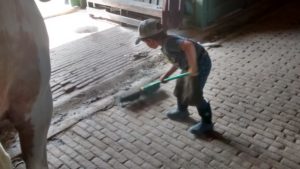Cleaning Up

Cleaning the work area will be one of the first responsibilities of the apprentice. Cleaning up shows the horse owner that the farrier cares about quality work and creates a safer work environment.
Whose responsibility is it to clean up after the farrier? Farriers inevitably make a mess each time they do their job. Manure, hoof trimmings and bent horseshoe nails litter the ground after each trimming or shoeing. Some farriers have the idea that the job is their responsibility and nothing more. They feel to let the owners clean up afterward. This bad practice can certainly affect a farrier’s business. A very upset horse owner told of how she called her farrier after he had left mess. When he picked up the phone, she said, “Do you like shoeing horses at my barn?” The farrier answered that he did. She said, “Well then you better get back here and clean up after yourself or this will be the last time that you work here.” To avoid embarrassing situations like this, it is best to clean up or to leave the work area “better than you found it.” Some considerate horse owners insist on cleaning up after the farrier, but these instances are unique and it is best not to assume that they will.
Cleanliness tells a horse owner a lot about the farrier. Farriery is a messy job even when the work is precision. Manure, dirt and thrush are filthy components of the job. Hot-fitting shoes create a foul smell that most people don’t appreciate. If a farrier doesn’t take note of this, it tells the horse owner that he or she just doesn’t care. Some farriers may not even know that this bothers the horse owners. Some farriers seem to revel in the muck. The farrier that makes an effort to make the overall job cleaner will prove his or her status as a professional. Farriers should strive for good presentation. A job may be perfectly balanced but if it doesn’t look good, an owner is not likely to have the farrier back.
Presentation carries over to how the farrier dresses and even how he or she has the truck organized. If a farrier shows up in an unkempt truck wearing sloppy attire, the horse owner is likely to make a judgment that the farrier does sloppy work. If the farrier does sloppy work, the horse owner will have his or her suspicions confirmed! Farriers can give off a good presentation by keeping an organized truck. Not only is it impressive for a horse owner to watch a farrier be able to find something in the truck, it is more efficient! Some of the smells are unavoidably transferred to the farrier’s clothes, but some farriers make it a habit to keep a change of uniform in the truck to change between appointments. Some farriers put blankets or seat covers down over their seats to prevent the bad smells from permanently steeping into the car’s upholstery. This helps with the retail value of the truck should the farrier ever want to trade it in!
Sweeping the floor after shoeing a horse helps to clear the area of bent nails and nail tips. This is especially important if the farrier did the work in the horse owner’s driveway. In this case, the farrier could bend the nails over and clip the ends off to avoid losing a sharp piece that could puncture a tire. Horse owners appreciate this. It is never good when the tire repair mechanic finds that the cause of a flat tire is a horseshoe nail! Another good idea is to run a large industrial magnet over the work area to pick up any pieces of nail that the naked eye misses.
Apprentices or helpers may not be able to help the farrier with critical parts of the job in the beginning, but they can always be cleaning up. Farriers appreciate a clean work space. Apprentices can sweep the floor between horses and help to clean up everything at the end of the day. A teacher knows that an apprentice is serious about learning when they are willing to work hard at even seemingly menial tasks. It makes the job more efficient when the apprentice knows the whole trimming or shoeing process and can anticipate what the teacher will need next, including a clean work space.
Farriers show they care when they clean up. Taking responsibility for a mess is a part of the job. It isn’t always the most glamorous part of the job, but it needs to be done. Farriers who don’t clean up, may find that they are not around for the glamorous part of getting paid!
Related Posts
-
Farriers can get annoyed with people that they feel are unju...Nov 16, 2017 / 0 comments
-
These last few weeks, I have been working in the tractor in ...Aug 08, 2019 / 0 comments
-
As the winter months set in, many horse owners have the ques...Nov 29, 2018 / 0 comments
Blog Categories
- Anatomy
- Best Business Practices
- Conformation
- Current Events
- Customer Service
- Draft Horse Shoeing
- Equine Soundness
- Essential Anatomy Kit
- Farrier Careers
- Farrier training
- Foal soundness
- Horse Care
- Horse Foot Care
- Horse Owner Tips
- Horsemanship
- Horseshoeing
- Horseshoeing History
- Iron and Forge Work
- Student Spotlight
- Uncategorized
- Veterinary Care
Blog Archives
Contact Us
Butler Professional Horseshoeing School
495 Table Road
Crawford, NE 69339
(800) 728-3826
jacob@dougbutler.com
Subscribe to Our Blog
Get Our Free e-Book!
If you think you want to become a farrier (or know someone who does), this book can help you make that decision. Horse owners will learn the importance of choosing a qualified farrier and how to select the “right” one.
[ Get the e-Book Now! ]
- Follow:
